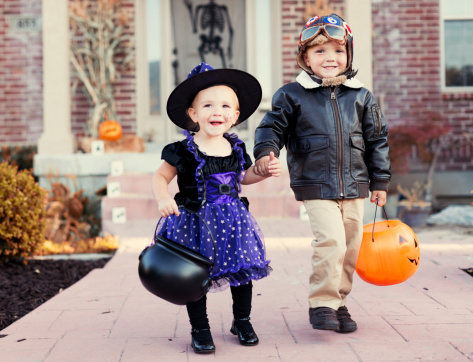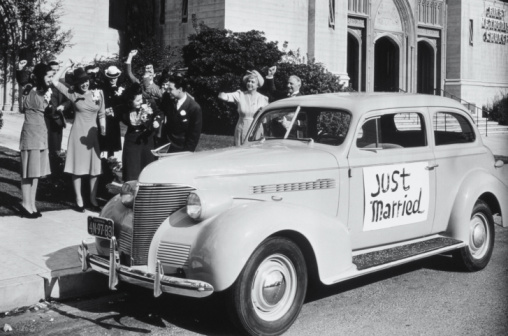
The psychologist Anthony Wolf wrote a book about divorce and kids entitled
Why Do You Have to Get a Divorce? And Can I Still Get a Hamster? I love the title of this book, because it identifies both the big picture concerns and the day to day questions children will have about how their lives will change when parents get
unmarried.
At this time of year, most elementary school aged children, and some older kids too, become excited about Halloween. Though it has deep roots in ancient cultural traditions, in today’s American culture Halloween is truly the children’s holiday. Kids love to dress up and pretend, and most are thrilled to go trick or treating or attend special events and come back with a stash of treats. Some kids plan their Halloween costumes for months in advance, and it’s not uncommon for homes to be extensively decorated with more than just jack-o-lanterns.
Holidays are usually difficult times for families experiencing divorce, about which I have written earlier. I am focusing on Halloween in this October blog post because this uniquely children’s holiday is right around the corner. Here are four tips for creating a positive experience for your children:
- Manage your expectations so your kids can manage theirs. This may not be the year that Mom will be able to spend hours at the sewing machine making elaborate homemade costumes. But it may be the year that your kids have a friendly competition for who can make the most creative costume out of things already in the closets, drawers and attics at home. If your child has his or her heart set on getting a particular costume, and you want to honor this dream, be sure to budget for the purchase of the costume.
- Ask your kids what is most important to them about Halloween and focus your energy accordingly. This often requires co-parent cooperation, for which your kids will be grateful If their favorite part is carving pumpkins, make this activity as festive as possible, and be sure to take lots of pictures to send to your co-parent if s/he is not participating. If the high point is trick or treating, decide in advance whether one or both parents will be responsible for taking them out and whether one parent will stay behind to hand out treats. If you are separated, decide in advance which neighborhood is likely to be the most fun for trick or treating this year, and go from there.
- Rely on your support system. Trick or treating or going to a Halloween event with neighbors, friends or cousins can help create a fun experience for your kids if your own energy is depleted.
- Determine co-parenting ground rules for how to handle the stash of treats, e.g. how much can be right away and how the remainder will be saved and distributed. Work this out in advance so your children will not be in the middle of a parental argument on Halloween .
I wish you and your children a peaceful and happy Halloween!
 Why are less and less couples getting married? Is it because their parent’s marriages failed? Is it because they don’t see any benefit to marriage? Is it because every wedding appears to be a $20,000 extravagant country club affair?
Maybe, as was written in a recent New York Times article, “…marriage has gone from being a way that people pulled their lives together to something they agree to once they have already done that independently.”
There are several problems with this way of thinking.
One is that children don’t wait for marriage. More and more children are born outside of marriage. This is a problem if the parents separate without ever marrying, because then (at least in Minnesota) the father has no enforceable legal rights to parenting time until he spends a significant amount of time and money to get a judge to order that he can have parenting time with the child. This is true regardless of whether the father has raised the child jointly with the mother since the child’s birth. This is a bad deal for both the father and the child as it typically significantly interrupts their relationship and causes unwarranted stress on the child.
Another reason is that marriage is a financial life jacket in terms of protections for the lower earning spouse and a fair division of the assets accumulated during the marriage. This is one reason same-sex couples had been yearning for the protection of marriage until it became the law in Minnesota in 2013. Same-sex couples were not entitled to a fair division of the house or their partner’s retirement account, without access to the institution of marriage.
Because it is risky financially to accumulate assets together before marriage and because marriage helps protect the father-child relationship for the benefit of child, it is risky business to delay marriage if you are having a child together or are otherwise in a committed relationship.
Why are less and less couples getting married? Is it because their parent’s marriages failed? Is it because they don’t see any benefit to marriage? Is it because every wedding appears to be a $20,000 extravagant country club affair?
Maybe, as was written in a recent New York Times article, “…marriage has gone from being a way that people pulled their lives together to something they agree to once they have already done that independently.”
There are several problems with this way of thinking.
One is that children don’t wait for marriage. More and more children are born outside of marriage. This is a problem if the parents separate without ever marrying, because then (at least in Minnesota) the father has no enforceable legal rights to parenting time until he spends a significant amount of time and money to get a judge to order that he can have parenting time with the child. This is true regardless of whether the father has raised the child jointly with the mother since the child’s birth. This is a bad deal for both the father and the child as it typically significantly interrupts their relationship and causes unwarranted stress on the child.
Another reason is that marriage is a financial life jacket in terms of protections for the lower earning spouse and a fair division of the assets accumulated during the marriage. This is one reason same-sex couples had been yearning for the protection of marriage until it became the law in Minnesota in 2013. Same-sex couples were not entitled to a fair division of the house or their partner’s retirement account, without access to the institution of marriage.
Because it is risky financially to accumulate assets together before marriage and because marriage helps protect the father-child relationship for the benefit of child, it is risky business to delay marriage if you are having a child together or are otherwise in a committed relationship.  Why are less and less couples getting married? Is it because their parent’s marriages failed? Is it because they don’t see any benefit to marriage? Is it because every wedding appears to be a $20,000 extravagant country club affair?
Maybe, as was written in a recent New York Times article, “…marriage has gone from being a way that people pulled their lives together to something they agree to once they have already done that independently.”
There are several problems with this way of thinking.
One is that children don’t wait for marriage. More and more children are born outside of marriage. This is a problem if the parents separate without ever marrying, because then (at least in Minnesota) the father has no enforceable legal rights to parenting time until he spends a significant amount of time and money to get a judge to order that he can have parenting time with the child. This is true regardless of whether the father has raised the child jointly with the mother since the child’s birth. This is a bad deal for both the father and the child as it typically significantly interrupts their relationship and causes unwarranted stress on the child.
Another reason is that marriage is a financial life jacket in terms of protections for the lower earning spouse and a fair division of the assets accumulated during the marriage. This is one reason same-sex couples had been yearning for the protection of marriage until it became the law in Minnesota in 2013. Same-sex couples were not entitled to a fair division of the house or their partner’s retirement account, without access to the institution of marriage.
Because it is risky financially to accumulate assets together before marriage and because marriage helps protect the father-child relationship for the benefit of child, it is risky business to delay marriage if you are having a child together or are otherwise in a committed relationship.
Why are less and less couples getting married? Is it because their parent’s marriages failed? Is it because they don’t see any benefit to marriage? Is it because every wedding appears to be a $20,000 extravagant country club affair?
Maybe, as was written in a recent New York Times article, “…marriage has gone from being a way that people pulled their lives together to something they agree to once they have already done that independently.”
There are several problems with this way of thinking.
One is that children don’t wait for marriage. More and more children are born outside of marriage. This is a problem if the parents separate without ever marrying, because then (at least in Minnesota) the father has no enforceable legal rights to parenting time until he spends a significant amount of time and money to get a judge to order that he can have parenting time with the child. This is true regardless of whether the father has raised the child jointly with the mother since the child’s birth. This is a bad deal for both the father and the child as it typically significantly interrupts their relationship and causes unwarranted stress on the child.
Another reason is that marriage is a financial life jacket in terms of protections for the lower earning spouse and a fair division of the assets accumulated during the marriage. This is one reason same-sex couples had been yearning for the protection of marriage until it became the law in Minnesota in 2013. Same-sex couples were not entitled to a fair division of the house or their partner’s retirement account, without access to the institution of marriage.
Because it is risky financially to accumulate assets together before marriage and because marriage helps protect the father-child relationship for the benefit of child, it is risky business to delay marriage if you are having a child together or are otherwise in a committed relationship. 



